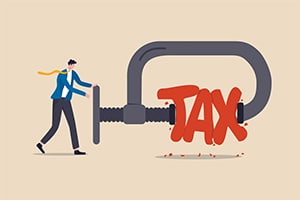
Business Advisory Services
Everything you need to help you launch your new business entity from business entity selection to multiple-entity business structures.
Hey - Our site just had a makeover and we are sorting through the hiccups!
Hey - Our site just had a makeover and we are sorting through the hiccups!

Everything you need to help you launch your new business entity from business entity selection to multiple-entity business structures.

Designed for rental property owners where WCG CPAs & Advisors supports you as your real estate CPA.

Everything you need from tax return preparation for your small business to your rental to your corporation is here.

Table Of Contents


The Hobby Loss Rules are governed by Internal Revenue Code Section 183 and include what’s called a Safe Harbor test to determine if your business is really a hobby. It relies on how many years you report a profit versus a loss on your tax returns (Schedule C). In general, it is assumed if you have profit 3 out of 5 consecutive years, you are engaged in a for-profit activity and therefore not a hobby. If you have more years of losses, you have to prove you are involved in operations for profit, not just for fun. Don’t worry! Profit can still be fun! We are continuously amazed at what people do for a living. Amazing!
The IRS’s website has some excellent hobby loss rule resources as well, and explains how to deduct hobby expenses. Note that we said expenses and not necessarily losses. Yup! If you are deemed to have a hobby and not a business, you may still deduct the hobby expenses against the hobby revenue.
Back to the issue at hand… wanting to deduct your business losses… just like your father might have said, your actions are going to speak much louder than your words. Generally, an activity qualifies as a business if it is carried on with the reasonable expectation of earning a profit. In order to make this determination, you should consider the following factors which are detailed in IRC Section 1.183-2(b)–
Warning: this is not an all or nothing or weighted list. The Tax Court looks at the full picture and how each factor relates to the facts as a whole. For example, are you a concrete contractor waiting for the housing market to pick back up? Are you a tech start-up developing a new product that will take 5-7 years to bring to market.
Thankfully, there are a few Tax Court cases that give us some foundation to fall back on to ensure that while figuring out the whole “How to Make a Profit” thing, that we don’t get dumped into the Hobby Loss pit of misery instead of bonafide Business Loss (which is equally miserable but at least tax deductible).
Generally, an activity qualifies as a business if it is carried on with the reasonable expectation of earning a profit. Here are some questions to consider-
Does the time and effort put into the activity indicate an intention to make a profit? If you only spend a few hours here and there, this might appear more like a hobby. Keeping a quick logbook or diary listing your hours might be helpful.
Does the taxpayer depend on income from the activity? If you have another job that is your main source of income, and you do not rely on your business for your livelihood, the IRS might consider it a hobby. At some point there needs to be a detrimental reliance on the income to be considered a business.
If there are losses, are they due to circumstances beyond the taxpayer’s control or did they occur in the startup phase of the business? In other words, are you simply losing money to shelter other income or are you losing money for appropriate reasons? Did customers stop buying VHS in favor of DVDs, and you were invested heavily in the VHS business? Are your expenses considered start-up costs, or could they be considered daily operational expenditures which might be considered hobby expenses instead of business expenses.
Has the taxpayer changed methods of operation to improve profitability? Does the taxpayer or his/her advisors have the knowledge needed to carry on the activity as a successful business? The IRS agent will ask about the steps you are taking to attract new customers, make sales, reduce costs, improve your knowledge of the industry, etc. If you can demonstrate that you are taking the necessary actions to earn a profit such as advertising activities and conference registrations, then your actions will suggest a legitimate business.
Has the taxpayer made a profit in similar activities in the past? Does the activity make a profit in some years? The IRS presumes that an activity is carried on for profit if it makes a profit during at least three of the last five tax years, including the current year.
Can the taxpayer expect to make a profit in the future from the appreciation of assets used in the activity? Some taxpayers are involved in businesses that purchase property in hopes of increased value upon re-sale. Businesses involved in photography, art, music rights, automobiles, stocks, etc. who can demonstrate this connection will be considered a legitimate business.
As any politician and economist will tell you, the key to a healthy economy is the strength of small businesses. Small businesses innovate, are typically the first ones to hire and have a unique way of becoming major players in local communities. Therefore, the tax code allows you to deduct business losses from other sources of income as a way to encourage you to take the risk of starting a new business.
In the same breath, politicians and economists will also say that the deduction of expenses for a venture that is a hobby does not help the economy and in some cases the venture might be a drain on society’s resources. It makes sense that the tax benefits of running a business should only exist if you are actually trying to turn a profit.
What if you cannot pass the 3 out of 5 test? Not to worry, you can still demonstrate a profit motive. Remember, the 3 out of 5 test presumes a business if there is profit. If you cannot pass the 3 out of 5 test, you are presumed by the IRS to be operating a hobby unless you can prove a profit motive.
As mentioned earlier, there are several reasons why legitimate businesses might not be able to show a profit for 3 years- some businesses take more time to materialize their profit, and others might be victims of horrible economic conditions (e.g., a concrete contractor waiting for the housing industry to pick back up). Three choices exist:
Here are some suggestions for demonstrating that your business is for real and not a hobby-

Prove Your Advertising. How many legitimate businesses don’t advertise? Not many. So, keep copies of your advertisements, business cards, flyers, letterhead, logo artwork, etc., and all the associated expenses (web development, graphic artist fees, etc.).
Track Your Actions. Use a business calendar app or something similar to show your actions, and how they are related to your eventual profitability. Who did you meet with? What publications did you read? Do you have a mentor? What type of training are you receiving? Conferences? How many hours per week are you spending on your activity?
Be Legit. Make sure you have all the permits and licensing required for your business. Create an LLC (we can help). Register your business in local directories.
IRS Regs. Review the items listed under Internal Revenue Code 1.183-2(b), and be in compliance with those items.
Rules under IRC Section 183 that determine if an activity is a business or hobby for tax purposes.
Show consistent profit motive, maintain records, advertise, and take steps to improve profitability.
You can still prove a profit motive through records, effort, and operational evidence.
Yes, but only up to the amount of income generated by the hobby.
Time spent, expertise, profit history, financial dependence, asset appreciation, and personal enjoyment.
Yes, it helps demonstrate professionalism and a profit motive.
Yes, as long as they are legitimate business expenses and not personal hobby losses.
Advertising, training, tracking hours, attending conferences, and improving business operations.
Yes, having all necessary legal registrations strengthens your business case.
Internal Revenue Code 1.183-2(b) provides the official criteria for business vs. hobby classification.

Want to talk to us about tax return preparation, tax planning and strategy, and all the other things that go with it? We are eager to assist! The button below takes you to our Getting Started webpage, but if you want to talk first, please give us a call at 719-387-9800 or schedule an discovery meeting.
Jason Watson, CPA is a Partner and the CEO of WCG CPAs & Advisors, a boutique consultation and tax preparation CPA firm serving clients nationwide with 7 partners and over 90 tax and accounting professionals specializing in small business owners and real estate investors located in Colorado Springs.
He is the author of Taxpayer’s Comprehensive Guide on LLC’s and S Corps and I Just Got a Rental, What Do I Do? which are available online and from mostly average retailers.
Table Of Contents

Tax planning season is here! Let's schedule a time to review tax reduction strategies and generate a mock tax return.

Tired of maintaining your own books? Seems like a chore to offload?
Did you want to chat about this? Do you have questions about us? Let’s chat!
The tax advisors, business consultants and rental property experts at WCG CPAs & Advisors are not salespeople; we are not putting lipstick on a pig expecting you to love it. Our job remains being professionally detached, giving you information and letting you decide within our ethical guidelines and your risk profiles.
We see far too many crazy schemes and half-baked ideas from attorneys and wealth managers. In some cases, they are good ideas. In most cases, all the entities, layering and mixed ownership is only the illusion of precision. As Chris Rock says, just because you can drive your car with your feet doesn’t make it a good idea. In other words, let’s not automatically convert “you can” into “you must.”
Let’s chat so you can be smart about it.
We typically schedule a 20-minute complimentary quick chat with one of our Partners or our amazing Senior Tax Professionals to determine if we are a good fit for each other, and how an engagement with our team looks. Tax returns only? Business advisory? Tax strategy and planning? Rental property support?

Everything you need to help you launch your new business entity from business entity selection to multiple-entity business structures.

Designed for rental property owners where WCG CPAs & Advisors supports you as your real estate CPA.

Everything you need from tax return preparation for your small business to your rental to your corporation is here.


